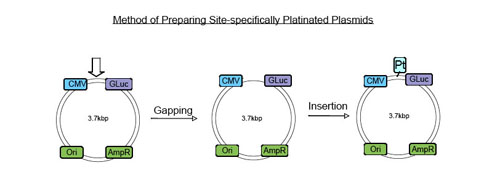
MyatNoeZin Myint
Massachusetts Institute of Technology
Lippard Lab
Mentor: Dr. Wee Han Ang
Summer 2009
Preparation of Mammalian Expression Vectors Incorporating Site-Specifically Platinated Monofunctional Pt-DNA Lesions
Platinum-based anticancer drugs, such as cisplatin, are important chemotherapeutic agents used in clinic for the treatment of a variety of cancers. Their anticancer activity is believed to stem from their ability to form Pt-DNA lesions in the nucleus, resulting in the arrest of key cellular functions such as transcription and replication. We have been interested in investigating cis-diammine(pyridine)-chloroplatinum(II) (cDPCP) as an anticancer agent since preclinical studies in vitro indicated that cDPCP is capable of forming Pt-DNA lesions that are strong inhibitors of transcription. Unlike conventional platinum-based drugs such as cisplatin and oxaliplatin, cDPCP is capable of forming only monofunctional Pt-DNA lesions. We applied a recently reported methodology to prepare plasmids containing a single site-specific platinum-DNA adduct of cDPCP as transcription probes. We further utilized these innovative monofunctional-platinated plasmids in live repair-deficient human fibroblast cells and investigated the ability of these monofunctional Pt-DNA lesions in blocking transcription.
